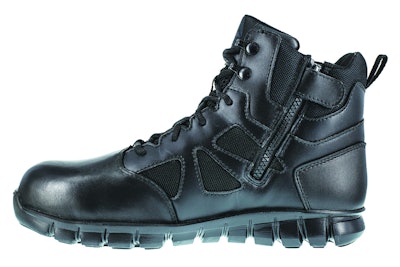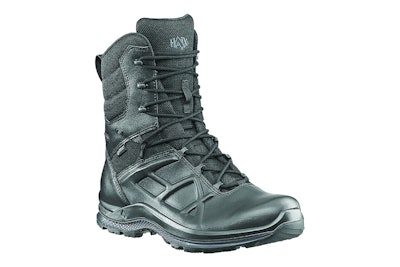 Officers carry a lot of weight, so comfort is vital. You want the right balance between rigidity and flexibility in the sole and side panels.Photo: Reebok
Officers carry a lot of weight, so comfort is vital. You want the right balance between rigidity and flexibility in the sole and side panels.Photo: Reebok
While many pieces of duty gear are department-issued and cannot be replaced with another product from a different manufacturer, police officers are given a certain amount of latitude in selecting some of the items they use every day. One of those items is footwear.
Some officers still prefer traditional low-cut shoes. But increasingly, officers are favoring over-the-ankle patrol boots—typically about seven or eight inches in height. Some go with all-leather models while others—particularly those working in warmer conditions—go with the so-called desert boot, typically constructed from suede and a breathable material.
Of course, motor officers choose much taller boots that go up to just beneath the knee, providing needed protection from flying road debris, as well as extra warmth and waterproofing for cold and wet riding conditions.
When it comes to brands and types of boots, the available options are nearly limitless, making the decision-making process a potentially difficult one. But there are some tips that can make it easier. Here are some things to keep in mind when buying patrol boots.
Fit and Comfort
If your feet are not happy, then after a while, the rest of the body may not be very happy either, so fit and comfort are vitally important.
Officers carry a lot of weight, so comfort is vital. You want the right balance between rigidity and flexibility in the sole and side panels.
No two pairs of feet are alike, so an officer may have to try on a number of different manufacturers to find the patrol boot that's right for them. This is where the expert assistance of someone really well versed in selling footwear can make a world of difference. Certain trusted retailers have years of experience and decades of institutional knowledge on finding the right fit for individuals.
 There is a balance between sole compound hardness and slip resistance in patrol boots that is very similar to tire manufacture.Photo: Haix
There is a balance between sole compound hardness and slip resistance in patrol boots that is very similar to tire manufacture.Photo: Haix
Quality
Don't skimp on boots. Working footwear is definitely an area where you get what you pay for.
Cheap boots can cause serious health issues, including blisters, bunions, calluses, corns, hammertoes, heel spurs, ingrown toenails, mallet toes, and worse. The foot and ankle contain 26 bones; 33 joints; and more than 100 muscles, tendons, and ligaments. Bad boots can cause damage to any one of the above. If you try to save money on boots, you may end up eventually spending that money at the doctor's office and the pharmacy.
Furthermore, cheap boots tend to fall apart rather quickly, forcing an officer to spend more money in the long run than if they'd gone for the pricier but better option. Spending real money up front on boots that are constructed out of the highest quality materials is an investment well worth it.
Finally, high-quality boots can be maintained for many years, with good bee's wax for the leather and replacement soles expertly installed by a professional cobbler every few years.
Reputation
This is somewhat related to the quality issue discussed above. There are some boot models—even from top-tier manufacturers—that may have looked good on paper, but aren't up to the task on the street. They end up being "tacti-cool" wastes of money.
Ask around among your colleagues about their own experience with various manufacturers. Ask the retailer as well.
Weather Conditions
Do you go with waterproof—generally speaking, boots with all-leather construction—or not? Are you going to be wearing these in rainy conditions or conducting suspect searches in wetlands? Gore-Tex lining will keep your feet dry.
How much insulation do you need? Thinsulate is wonderful stuff in winter, but in summer can become uncomfortable. Remember, if you need waterproofing and/or insulation, added weight can't be avoided.
For dryer weather, a light, flexible boot might be preferred. Further, if you work in hot conditions, your boots shouldn't be too high because the taller the boot, the more heat is trapped.
Missions and Assignments
What's your patrol assignment? If you're a beat cop on foot patrol who spends the vast majority of their shift walking around, you're going to want to get a boot with ample cushioning.
If you work in a really rural area where you spend a good portion of your time in the woods, you might want to get a slightly heavier boot.
SWAT officers may also have the need for puncture-proof soles, and possibly steel-toes. Some duty boots have toe caps made of polymer or a similar material for toe protection.
Slip Resistance
Watch any IndyCar race, and you'll quickly note that the commentators spend a substantial amount of time talking about the relative hardness or softness of the red-, yellow-, and black-walled tires. The harder tires last longer, but don't grip as well as the softer options. There is a balance between compound hardness and slip resistance in patrol boots very similar to tire manufacture.
Sole compounds are measured using durometer hardness. SWAT officers might elect to go with softer, "grippier" compounds, while patrol officers might go for the slightly harder option.
Almost all manufacturers now have soles that are mark resistant, which is good since citizens don't much like big black streaks on their expensive kitchen tile. Just to make sure, while you're asking about slip resistance, make sure to also inquire about whether your boots will leave skids all over the place.
Closures and Hardware
So-called "speed laces" aren't usually especially speedy. Zippers are fast, but if they fail, you might have only one option—toss the boots in the trash and head to the store.
If you choose traditional laces, always have a set of spare laces in your go bag, and maybe another set in your locker. Buy the replacements when you buy the boots so you'll be prepared.
Bellows tongues must have pre-scored folds, or they are borderline useless.
Nowadays, plastic—or other nonmetallic—hardware with impregnated color is preferred for the eyelets.
Double Up
When you find your "Goldilocks"—the patrol boot that's "just right" for you—purchase more than one pair. At minimum, buy two pair so you can alternate them from one day to the next. The boots you wore on yesterday's tour will have a full day to fully dry out, adding to the longevity of the boot.
Yes, it's expensive, but if you can afford it. In the long run you'll have to replace your boots much farther down the road than if you get just one pair and run them into the ground day in and day out.
Your Health
Deciding on your duty boot can be an arduous process, at times with some measure of "trial and error" involved. However, that investment in time and money can help you prevent suffering from spinal problems, knee problems, foot problems, or other medical maladies—both on duty and well into your retirement.
Last word on health-related matters—if you have a pre-existing condition of any kind related to any of the abovementioned medical issues, you may want to consult with a podiatrist before even setting out for the retail store to shop for new duty boots. They may be able to help guide you toward the best boot to help relieve you of any existing pain.
Doug Wyllie is contributing web editor for POLICE.

















